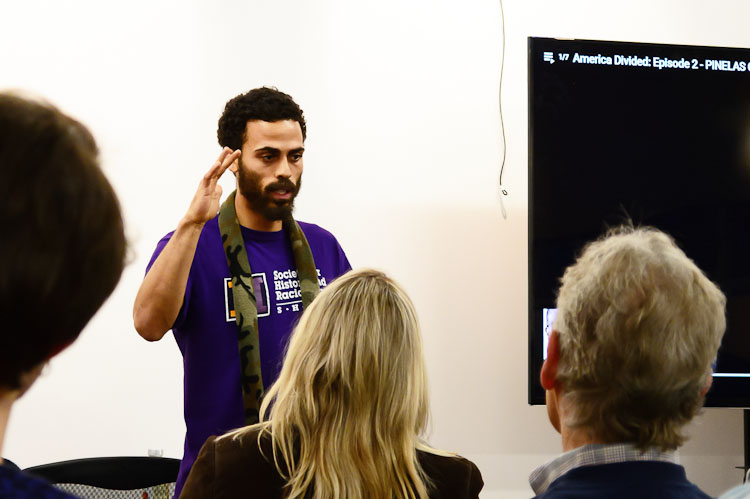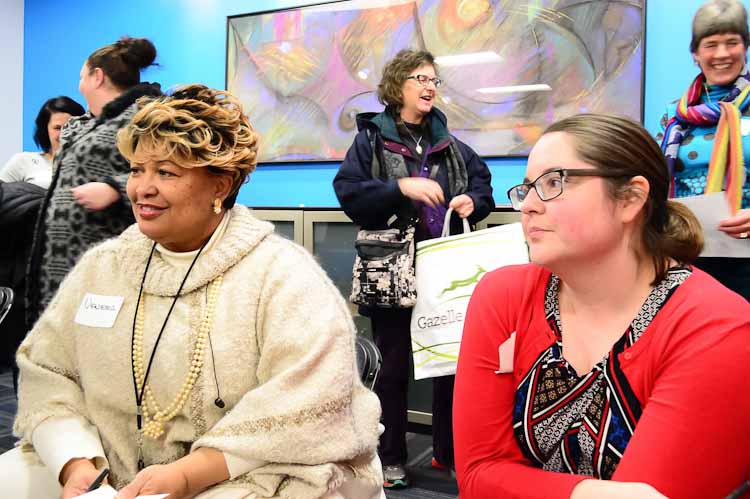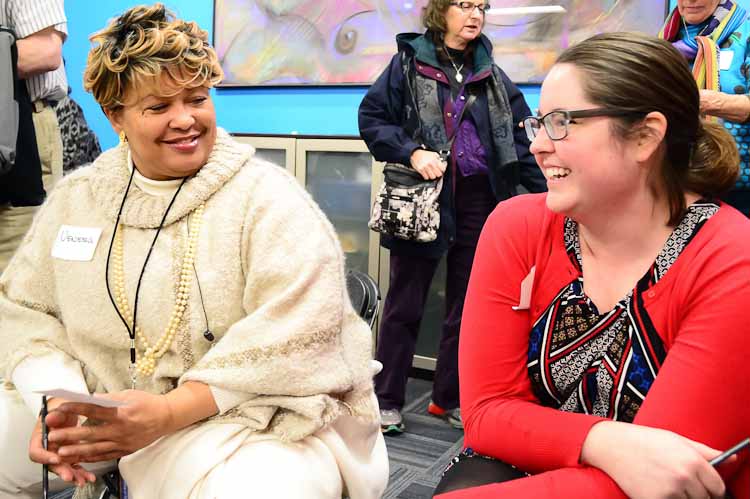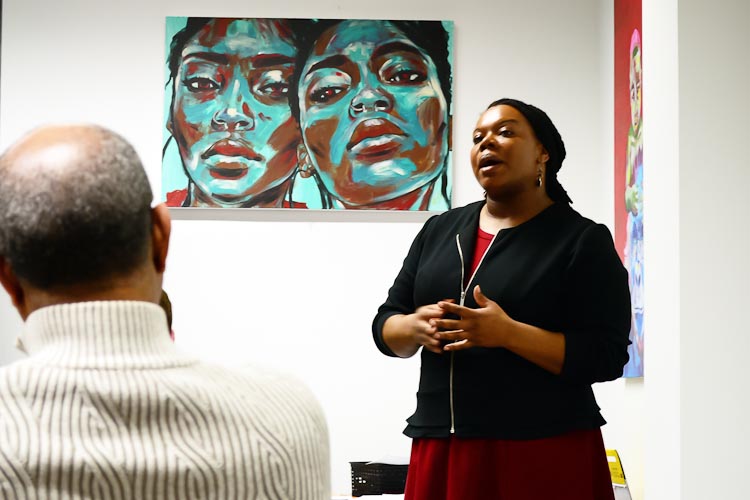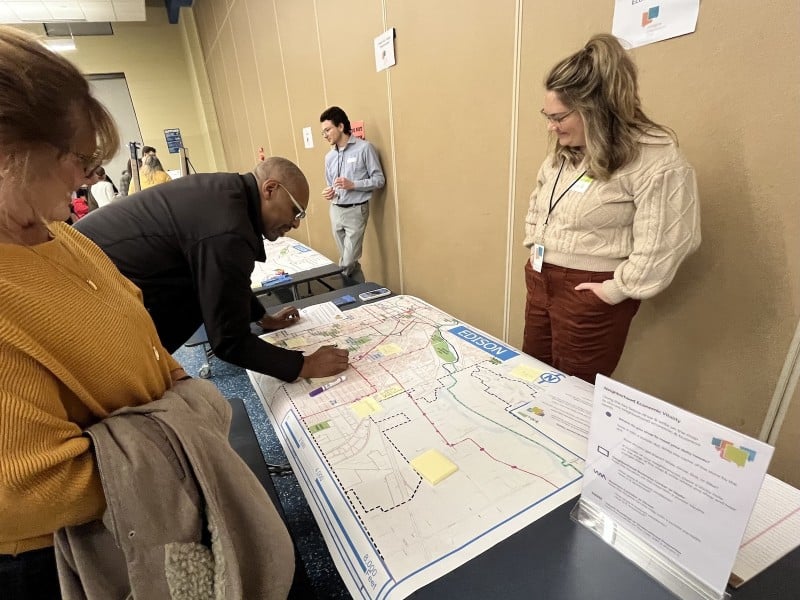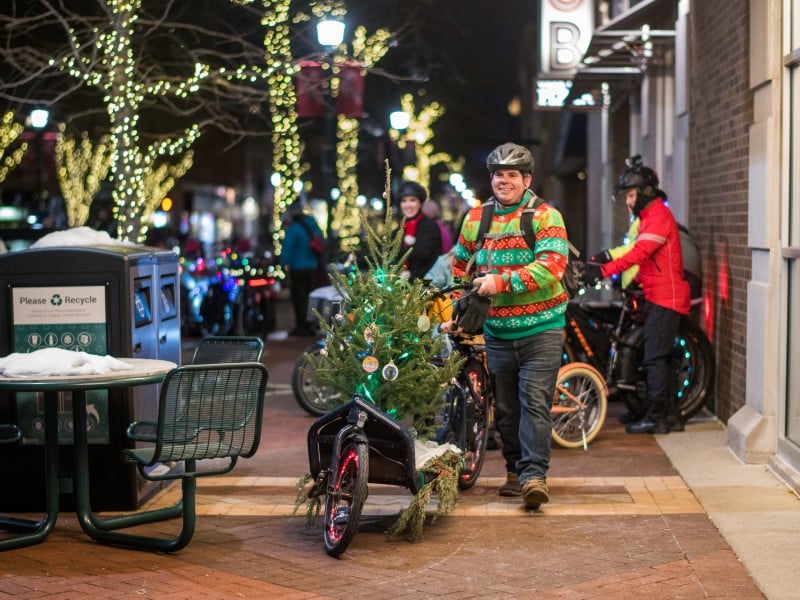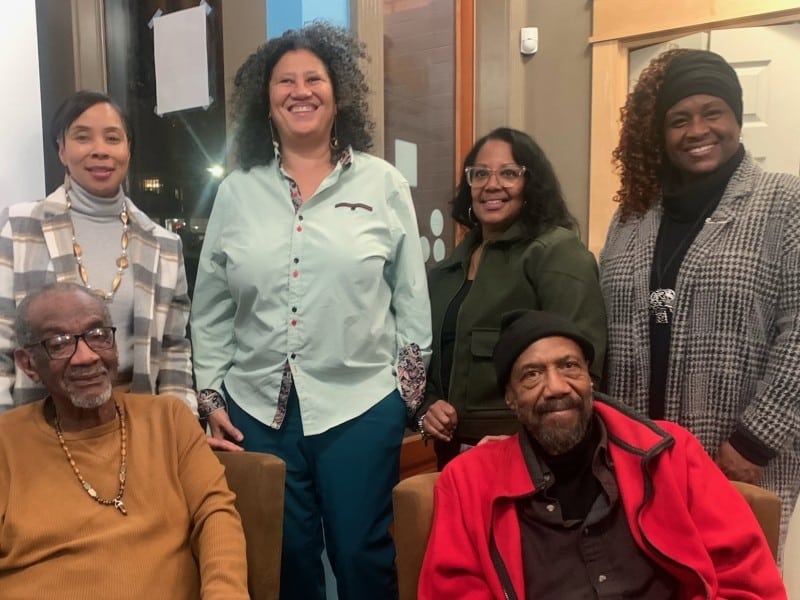Anti-racism initiative explores tested ways to talk about and change what ails America
The Truth, Racial Healing, and Transformation Initiative has come to Kalamazoo and it's got people talking and taking action.
It’s an overwhelming curse, older than this country, with threads woven through the fabric of society.
One day of talk didn’t cure racism. No one expected it to. But Kalamazoo’s Day of Healing event, Jan. 17 at the Epic Center, brought out a capacity crowd of a variety of citizens willing to talk about the curse–and that was a good sign, event speakers and organizers say.
The National Day of Racial Healing was sparked by the W.K. Kellogg Foundation’s Truth, Racial Healing, and Transformation Initiative (TRHT).
This first Day of Healing came out of a WKKF Truth, Racial Healing, and Transformation summit at Carlsbad, Cal. Dec. 1. Events took place from San Francisco to New Orleans to west Michigan’s Holland, Kalamazoo and Battle Creek.
The exact target of the Truth, Racial Healing, and Transformation Initiative is the belief in a “hierarchy of human value” WKKF press material states. “This absurd belief, which has fueled racism throughout American culture, is the perception of inferiority or superiority based on race, physical characteristics, or place of origin.”
Kalamazoo’s event featured an introduction to the basics of the TRHT, clips from the EPIX documentary series “America Divided” and words from speakers.
Then it was time to turn our chairs and talk to whoever was near. My spouse, Jules Isenberg-Wedel, and I found ourselves in a small group discussion with Vanessa Collins-Smith and Marcy Dix.
We spoke openly. The last round of “America Divided” clips tackled crime, the justice system and lack of trust for the police in urban communities. That inspired Collins-Smith to talk about her childhood, how neighbors watched over children to make sure they were safe and stayed out of trouble. We then discussed churches’ roles, the nosiness of small towns and the responsibilities of adults as role models. We ended with an unanswered question: Why does it seem that neighborhood life is becoming less social, with neighbors more isolated from each other than they were in the past?
What would you’ve added to the conversation?
Talking it out, not just airing grievances
Speaker Alisa Parker, Kalamazoo attorney, had attended the TRHT summit in California with around 500 people from around the country. “It’s a work in progress, but we’re really excited about it,” she told the audience.
Initially, she worried that the summit would try to cure racism by having people “sitting around a circle, holding hands and singing ‘Kumbaya,'” she said.
What Parker encountered instead was a framework for talk and discussion. The WKKF seemed to have applied “almost a scientific method to addressing racial barriers, systematic racism.”
There were “healing circles,” but no “Kumbaya,” she says in an interview after the Kalamazoo event. The TRHT asked that people open up in “a healing space,” where “people are going to have honest conversations–I liked the fact that it was a calming way to introduce having conversations on intense topics,” Parker says.
The first topic Parker participated in was: “Describe an experience where you were first aware of racism.” A large man spoke of people always assuming he played football when in fact he was a concert violinist, she remembers. That led a black pianist to express anger that people sometimes seemed shocked at his profession.
“It spun off into other conversations, and you begin to get into people’s experiences,” Parker says. “You have a different kind of conversation that begins a bigger conversation, and you can talk about solutions from a different place because you also know where a person is coming from, from just a basic human element.”
Parker says she’s “not a particularly touchy-feely person, but what I did appreciate about this is it was getting back to some real basic elementary values, that we learned about talking to each other and getting to know each other.”
The TRHT framework “let people talk about these things, let people get it out, and not just for the sake of saying, ‘now we’ve aired our grievances’ so to speak, but telling these stories so we have a better conversation, and then come back to the table to talk about solutions-building,” she says.
“I understand you better, at the core of your humanity, and the experiences that you had, so I have a better understanding of where you’re coming from when you put something on the table…. I can see behind the curtain a little bit better.”
It’s a way of discussing a hot topic without being partisans defending or attacking viewpoints. Parker agrees that it reminds one of this line President Obama’s farewell address: “If you’re tired of arguing with strangers on the Internet, try to talk with one in real life.”
Talk, then get to work
Parker adds, at the TRHT seminar “there weren’t necessarily solutions, but there was a lot of conversation about how do you take this work back to your community.”
Jacob Piney-Johnson, as a representative of SHARE (Society for History and Racial Equity), ERACCE (Eliminating Racism and Creating/Celebrating Equity), and other groups, was also among the eight Kalamazoo activists who attended the seminar. He also spoke at the local Day of Healing.
“It’s not a one-time event, it’s really going to take some long-term effort in organizing to really address the illness of race and racism. But to see folks come out, to be in solidarity, to communicate and converse with each other about the topic…. it felt like a spark for me,” he says after the Kalamazoo event.
“The complexity of the issue is huge.” The TRHT guidelines break the issue down into areas of the economy, law, narrative change, separation and racial healing. “That’s one of the things I appreciate about the initiative,” he says. “It’s a multi-faceted approach.”
It’s designed to look below the surface. What we think of as obvious racism is just the tip of a large iceberg, he agrees–there’s a massive amount of ice below the water.
Piney-Johnson hopes these talks “on a basic level, tell the truth about the history, and build relationships with folks, and then go down deeper and really do some unpacking of that iceberg. See what’s really going on at the national level, and specifically, on the local level as well.”
He admires the TRHT’s inspirations, the truth and reconciliation commissions of South Africa, Canada and other countries, where oppression and atrocities were addressed in open dialogs that included everyone involved.
For the next step, he hopes for sessions that are “really looking into the future. What does a society look like,” he says, when it moves beyond “hierarchy, as a concept of human identity.”
Work will continue, he says. The TRHT is still organizing in Kalamazoo, with the next event to be announced. There have been, and continue to be, monthly events by anti-racism groups, Piney-Johnson reminds us. “The work of racial justice happens on many fronts, and that it really has to be a holistic approach.”
When asked about the beginning of the Trump administration, Piney-Johnson exclaims “Woo! We’ll see how that goes.”
But it looks like the changeover at the White House has sparked new interest in activism, not only for racial justice, but in other areas as well, on the local level in the blue county of Kalamazoo. This has been giving the other speaker and organizer Parker hope. “I’m encouraged by the people who’ve started to stand up,” she says.
The TRHT has encouraged Parker to talk with people she’s never spoken to about race, gender, and orientation. “It’s refreshing to a degree to be able to step into more spaces where people are having these conversations, willing to say ‘something has to give, something different has to happen.'”
She sees that the younger generation carries “attitudes of ‘this is ridiculous'” when it comes to racism, she says. “But this is the world that they live in. They got to see the first black president, but that’s the only thing that they’ve known, really.”
Ingrained racism is “something that every generation owns.” The TRHT model of open talk, she hopes, will allow this generation to have more productive conversations.
Mark Wedel has been a freelance journalist, working out of southwest Michigan since 1992. For more information: http://www.markswedel.com

